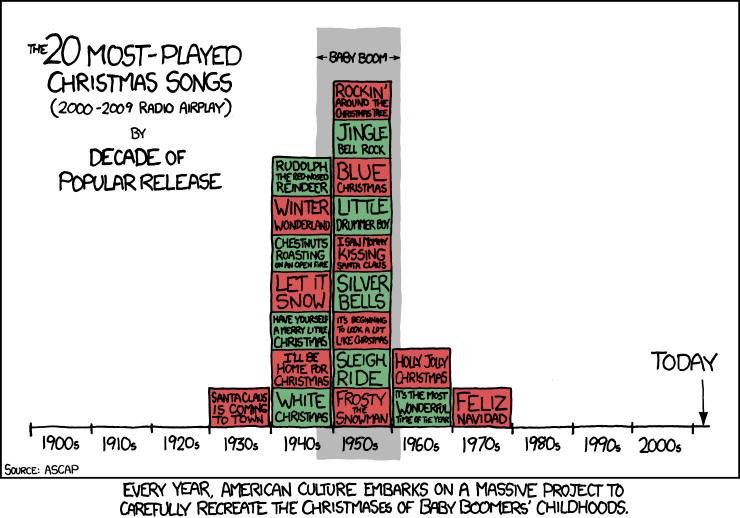Debase Christmas? Consumerism IS Christmas
It’s Christmas, a time when all of us wannabe commentators produce at least one predictable piece bemoaning the crass commercialization of Christmas.
These commentators assume that underneath the consumption is a meaningful cultural tradition worth saving. They assume that Christmas is merely debased by consumerism.
I call bullshit.
The modern Christmas is a modern invention, and commercialization is not it’s debasement, but it’s whole purpose.
In a recent comic, Randall Munroe noted that so much of the lyrical tradition we assume is a timeless part of Christmas, is in fact a product of 1950s America.

Randall Munroe theorises that a tradition is “anything that happened to a baby boomer twice”.
I would argue that these modern traditions are a product of what was happening in the most developed capitalist economy in the aftermath of the second world war.
The 1950s see the baby boom and the long post war boom in American economic growth. The industrial capacity utilized by the war could not simple lie idle, the pursuit of profit mandates that capital be reinvested. Without the war, a new market was required.
That market was domestic consumption.
American companies developed and sold all manner of goods to fill needs that the American working class never before knew they had. Marketing and mass media were the tools with which American business directly and indirectly created the new wants, the new needs, and the new culture, that we now identify as consumerism.
Those cultural traditions that supported consumption were emphasized. New cultural traditions were invented, existing traditions were transformed beyond recognition.
It was in this crucible that the modern Christmas was born. Christmas was re-written, it was transformed to serve the needs of a market predicated on selling ever more consumer goods to the working class.
Christmas today is little more than an amalgam of marketing strategies brought together under a faux cultural-religious brand. Any call to separate the tradition from the consumerism is now meaningless.
This piece was prompted by Ben Habib’s I’m Dreaming of a ‘Light’ Christmas.
Comments are closed.

The next person who, upon reading this, claims that I am some how “blaming the baby boomers” is getting bitch-slapped.
I understand your logic Kieran. One only need look at what happens to every style of underground music when it goes ‘mainstream’ to understand how “capitalism appropriates, co-opts and transforms all culture to serve profit,” as you say.
So let me pose you a hypothetical question: if capitalism collapsed completely tomorrow, would that be the end of Christmas as well? That’s gets to the issue at the heart of this discussion.
It’s not a particularly novel observation that Christmas has been bastardised by consumerism. We must then ask ourselves, is there something profound and meaningful about Christmas that runs deeper that its recent shallow commodification would suggest?
I argue that there is, and that attempting to reclaim this meaning represents a small step in reclaiming autonomy from the consumerist paradigm.
Collapsed completely…
Narrowly, no economic collapse can end capitalism. The ideas and class relations would remain, as would the cultural artefacts and traditions it had generated. Christmas would remain.
If we could wave a wand, and magically a revolutionary process has taken place, then that revolution has to have transformed ideas and cultural practice as well as class relations and the logic of production, or else no revolution has in fact taken place.
In that hypothetical, I would contend that nothing we now call Christmas would remain.
Perhaps the word would. And perhaps the word would be used to denote new cultural traditions and practices.
But it would have as much in common with Christmas under capitalism, as Christmas under capitalism has with the Christmas that existed under catholic feudalism!
And as a non-Christian the concept of “reclaiming” something of Christmas from capitalism makes about as much sense as a vegetarian trying to reclaim McDonalds…
I was reading Black Flame last night, in particular the chapter on anarchist social theory. Reflecting upon the above discussion in light of it, perhaps I am being overly deterministic. To flatly deny the possibility of a “reclaiming” of various cutural practices would be to deny agency, and to see us all as mere flotsam in the currents of capitalism.
- Source, pp.111